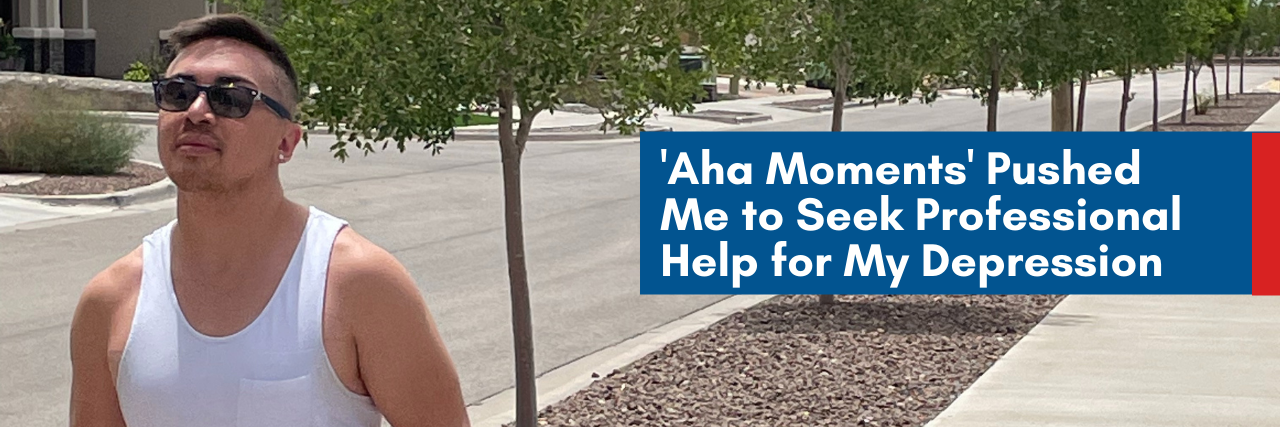'Aha Moments' Pushed Me to Seek Professional Help for My Depression
The only way I could describe how I was feeling with depression was that something seemed out of place. Over the years, I continued to feel sad and lost interest in things I once enjoyed. I also noticed a considerable change in my weight. These and the other symptoms made me realize that I couldn’t continue like this forever and I needed to do something about it.
I remember thinking I should talk to a doctor, but had a fear the doctor would laugh at me or think my symptoms weren’t valid. I remember also feeling ashamed around my family and friends; the prospect of having depression was taboo and not something I would want to share with anyone.

There were two “aha” moments that happened while I was in college, which pushed me to take action. The first was when I was confronted by one of my mentors, who was diagnosed with depression and recognized that I was struggling. She discussed the importance of speaking with a doctor about the signs and symptoms of depression. I didn’t act on this right away, but it made me think about whether I should talk to a doctor. The second turning point was when I was attending a lecture about Major Depressive Disorder (MDD), a type of depression, in pharmacy school. My professor discussed how MDD manifests as a complicated set of symptoms including (but not limited to) depressed mood, loss of interest or pleasure in things once enjoyed, trouble thinking clearly, being tired often, and being restless or moving slowly. The tricky part about MDD is that each person’s experience can be different.
Once I began to understand more about this specific type of depression, I knew I needed to talk to a doctor about what I was experiencing. After a thorough medical evaluation, my doctor diagnosed me with MDD. I talked to him about my feelings of depression over the years, and asked myself, “Do I need to keep living like this?” That was an important moment for me – everything I’d been feeling for years finally seemed to make sense. My doctor took the time to walk me through several treatment options and encouraged me to take an active role with him in my treatment plan. He explained that MDD treatment plans can include medications, like antidepressants, as well as talk therapy.
After I graduated college, I moved to Austin, TX. After a number of years of being in a new city, I was wondering why I continued to struggle with my MDD. I decided I needed to have another conversation with my doctor.
When my doctor told me about an antidepressant prescription medication called Trintellix® (vortioxetine) used to treat MDD in adults, he explained that it could be a good treatment for me to try.
He helped me understand what I could expect while taking Trintellix and explained all of the risks and benefits, like how Trintellix increases the risk of suicidal thoughts and actions in people 24 years of age and younger (of note, Trintellix has not been shown to be safe and effective for use in children). My doctor also advised that I should call him or get emergency help right away if I have new or worsening depression symptoms, new or sudden changes in mood, behavior, thoughts, or feelings, or if I develop suicidal thoughts or actions. My doctor also said that I shouldn’t take Trintellix if I’m allergic to vortioxetine or any other ingredients in Trintellix, or if I’m taking (or have stopped taking within the last 14 days) a medicine called a Monoamine Oxidase Inhibitor (MAOI), including the antibiotic linezolid or intravenous methylene blue.
Scroll below for additional Important Safety Information, including Full Boxed WARNING for Suicidal Thoughts and Actions. Click here for Medication Guide and discuss with your doctor.
Along with safety considerations, my doctor went over the positive treatment results from the clinical trials in adults with MDD. In multiple short-term studies, Trintellix was shown to help reduce the overall symptoms of MDD, based on an overall score on a standardized depression rating scale compared to sugar pills. Also, he explained to me that other studies have shown that Trintellix had a positive effect on processing speed, or how quickly a person can accurately process information. This is an aspect of cognitive function that may be impaired in adults with MDD. The improvement in processing speed may be the result of an improvement in depression. No studies have been conducted to see whether Trintellix is any better at improving processing speed than other antidepressants.
I appreciated that my doctor took the time to explain that, while antidepressants are known to be effective based on clinical trials, there are also potential side effects of these types of medications, including nausea, vomiting, weight gain, changes in sleep, treatment-emergent sexual dysfunction (TESD), and suicidal thoughts and actions.
The most common side effects of Trintellix are nausea, constipation and vomiting. Serious potential side effects include serotonin syndrome, increased risk of bleeding, manic episodes, discontinuation syndrome, eye problems, low levels of salt (sodium) in your blood, or sexual problems. These are not all the possible side effects of Trintellix.
On my current treatment plan, I feel my MDD is pretty well managed. I have good days and bad days. I’m proud to be a dog dad, a friend and an amateur karaoke singer. I also enjoy spending time outdoors and running. I am now prioritizing my health by having open and honest conversations with my doctor. Remember, this is just my experience, and yours may be different.
My life motto is, “try and find the good things, even in bad situations.” My number one recommendation for others living with MDD is not to give up hope, because things can change for the better. It’s so important to be your own advocate and to have an open and honest relationship with a health care professional to find a treatment plan that works for you.
Visit Trintellix.com to hear more stories like mine and learn about other patient resources, including the tAccess Support Program and the Trintellix Savings Card.** The tAccess Support Program provides personalized support (such as helpful messages and medication refill reminders) to help patients stay on track with their Trintellix treatment, as directed by their health care providers. The Trintellix Savings Card helps commercially-insured patients pay as little as $10 for either a 30- or 90-day prescription (restrictions apply).** The Savings Card is now available for download to patients’ mobile wallets, making it even easier to access discounts on Trintellix.**
*Jesus is a paid contributor for Takeda. Last name withheld to protect privacy.
** The TRINTELLIX Savings Card cannot be used by patients in federal-, state-, or government- funded health care programs, or by cash patients. Savings of up to $100 per 30-day or $300 per 90-day prescription, with maximum total savings of $1,300 over one year. Restrictions apply. See Savings Card for full Eligibility Requirements and Terms & Conditions.
What is TRINTELLIX (vortioxetine)?
TRINTELLIX is a prescription medicine used in adults to treat a certain type of depression called Major Depressive Disorder (MDD). TRINTELLIX has not been shown to be safe and effective for use in children.
IMPORTANT SAFETY INFORMATION
Suicidal Thoughts & Actions
TRINTELLIX and other antidepressants increase the risk of suicidal thoughts and actions in people 24 years of age and younger, especially within the first few months of treatment or when the dose is changed. TRINTELLIX is not for use in children. Depression or other mental illnesses are the most important causes of suicidal thoughts or actions. Pay close attention to any changes, especially new or sudden changes in mood, behavior, thoughts, or feelings, or if you develop suicidal thoughts or actions. Call your doctor or get emergency help right away to report any of these, or if you have symptoms such as suicidal thoughts or actions, impulsivity, aggressive or violent actions, depression, anxiety or panic attacks, agitation, restlessness, anger, irritability, trouble sleeping, an increase in activity or talking, or other unusual changes in behavior or mood; especially if they are new, worse, or worry you.
Who should not take TRINTELLIX?
Do not start or take TRINTELLIX if you:
- are allergic to vortioxetine or any of the ingredients in TRINTELLIX
- are taking, or have stopped taking within the last 14 days, a medicine called a Monoamine Oxidase Inhibitor (MAOI), including the antibiotic linezolid or intravenous methylene blue
Do not start taking an MAOI for at least 21 days after you stop treatment with TRINTELLIX.
What should I tell my doctor before taking TRINTELLIX?
Before taking TRINTELLIX, tell your doctor:
- about all your medical and other health conditions
- if you are pregnant or plan to become pregnant, since TRINTELLIX may harm your unborn baby. Taking TRINTELLIX during your third trimester may cause your baby to have withdrawal symptoms after birth or to be at increased risk for a serious lung problem at birth. Tell your doctor right away if you become or think you are pregnant while taking TRINTELLIX
- if you are breastfeeding or plan to breastfeed, since it is not known if TRINTELLIX passes into your breast milk
Tell your doctor about all the medicines you take, including prescription and over-the-counter medicines, vitamins, and herbal supplements, since TRINTELLIX and some medicines may cause serious side effects (or may not work as well) when taken together. Especially tell your doctor if you take: medicines for migraine headache called triptans; tricyclic antidepressants; lithium; tramadol, fentanyl, meperidine, methadone, or other opioids; tryptophan; buspirone; St. John’s Wort; medicines that can affect blood clotting such as aspirin, nonsteroidal anti-inflammatory drugs (NSAIDs), warfarin; diuretics; medicines used to treat mood, anxiety, psychotic, or thought disorders, including selective serotonin reuptake inhibitors (SSRIs) and serotonin norepinephrine reuptake inhibitors (SNRIs); or medicines used to treat seizures or convulsions.
What are the possible side effects of TRINTELLIX?
TRINTELLIX may cause serious side effects, including:
- Serotonin syndrome: A potentially life‐threatening problem that can happen when you take TRINTELLIX with certain other medicines. Call your doctor or go to the nearest emergency room right away if you have any of the following signs and symptoms of serotonin syndrome: agitation; seeing or hearing things that are not real; confusion; coma; fast heart-beat; changes in blood pressure; dizziness; sweating; flushing; high body temperature; shaking, stiff muscles, or muscle twitching; loss of coordination; seizures; nausea, vomiting, diarrhea.
- Increased risk of bleeding: Taking TRINTELLIX with aspirin, NSAIDs, warfarin or blood thinners may add to this risk. Tell your doctor right away about any unusual bleeding or bruising.
- Manic episodes: Manic episodes may happen in people with bipolar disorder who take TRINTELLIX. Symptoms may include: greatly increased energy; racing thoughts; unusually grand ideas; talking more or faster than usual; severe problems sleeping; reckless behavior; excessive happiness or irritability.
- Discontinuation syndrome: Suddenly stopping TRINTELLIX may cause you to have serious side effects including: nausea; sweating; changes in your mood; irritability and agitation; dizziness; electric shock feeling; tremor; anxiety; confusion; headache; tiredness; problems sleeping; hypomania; ringing in your ears; seizures.
- Eye problems: TRINTELLIX may cause a type of eye problem called angle-closure glaucoma in people with certain other eye conditions. You may want to undergo an eye examination to see if you are at risk and receive preventative treatment if you are. Call your doctor if you have eye pain, changes in your vision, or swelling or redness in or around the eye.
- Low levels of salt (sodium) in your bloood: Low sodium levels in your blood that may be serious and may cause death can happen during treatment with TRINTELLIX. Elderly people and people who take certain medicines may be at a greater risk for developing low sodium levels in their blood. Signs and symptoms may include headache; difficulty concentrating; memory changes; confusion; weakness and unsteadiness on your feet which can lead to falls. In more severe or more sudden cases, signs and symptoms include: seeing or hearing things that are not real; fainting; seizures; coma; stopping breathing.
- Sexual problems: Taking TRINTELLIX may cause sexual problems. Symptoms in males may include: delayed ejaculation or inability to have an ejaculation, decreased sex drive, or problems getting or keeping an erection. Symptoms in females may include: decreased sex drive, or delayed orgasm or inability to have an orgasm. Talk to your doctor if you develop any changes in your sexual function or if you have any questions or concerns about sexual problems during treatment with TRINTELLIX.
The most common side effects of TRINTELLIX include:
- nausea
- constipation
- vomiting
These are not all the possible side effects of TRINTELLIX. Tell your doctor if you have any side effect that bothers you or does not go away.
You are encouraged to report negative side effects of prescription drugs to the FDA. Visit www.fda.gov/medwatch or call 1‐800‐FDA‐1088.
For additional Important Safety Information, including Boxed WARNING for Suicidal Thoughts and Actions, click here for Medication Guide, and discuss with your doctor.
TRINTELLIX is a trademark of H. Lundbeck A/S registered with the U.S. Patent and Trademark Office and used under license by Takeda Pharmaceuticals America, Inc. TAKEDA and the TAKEDA logo are registered trademarks of Takeda Pharmaceutical Company Limited ©2024 Takeda Pharmaceuticals U.S.A., Inc. All rights reserved. 1-877-TAKEDA-7 (1-877-825-3327). US-VOR-0571v3.0 10/24


